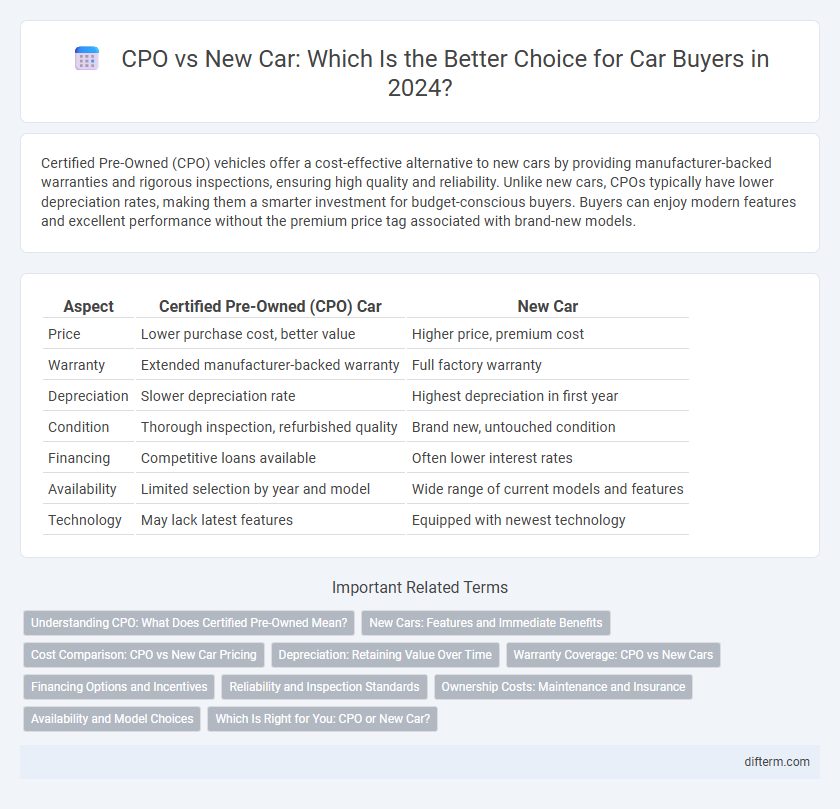Certified Pre-Owned (CPO) vehicles offer a cost-effective alternative to new cars by providing manufacturer-backed warranties and rigorous inspections, ensuring high quality and reliability. Unlike new cars, CPOs typically have lower depreciation rates, making them a smarter investment for budget-conscious buyers. Buyers can enjoy modern features and excellent performance without the premium price tag associated with brand-new models.
Table of Comparison
| Aspect | Certified Pre-Owned (CPO) Car | New Car |
|---|---|---|
| Price | Lower purchase cost, better value | Higher price, premium cost |
| Warranty | Extended manufacturer-backed warranty | Full factory warranty |
| Depreciation | Slower depreciation rate | Highest depreciation in first year |
| Condition | Thorough inspection, refurbished quality | Brand new, untouched condition |
| Financing | Competitive loans available | Often lower interest rates |
| Availability | Limited selection by year and model | Wide range of current models and features |
| Technology | May lack latest features | Equipped with newest technology |
Understanding CPO: What Does Certified Pre-Owned Mean?
Certified Pre-Owned (CPO) vehicles are pre-owned cars that have undergone rigorous inspections, reconditioning, and certification by the manufacturer or a certified dealership to ensure quality and reliability. CPO cars typically come with extended warranties, roadside assistance, and other benefits that provide a near-new car experience at a lower price point. Understanding CPO helps buyers make informed decisions by balancing cost savings with the assurance of manufacturer-backed guarantees compared to purchasing a brand-new car.
New Cars: Features and Immediate Benefits
New cars offer the latest automotive technologies, including advanced driver-assistance systems, improved fuel efficiency, and cutting-edge infotainment options. Buyers benefit from full manufacturer warranties and the ability to customize features to their preferences. Immediate ownership of a brand-new vehicle ensures zero wear and tear, providing optimal performance from day one.
Cost Comparison: CPO vs New Car Pricing
Certified Pre-Owned (CPO) vehicles generally cost 20-30% less than new cars while offering manufacturer-backed warranties and thorough inspections. New cars come with higher depreciation rates, losing up to 20% of their value within the first year, whereas CPO cars have already undergone this initial drop, offering better value retention. Buyers benefit from lower insurance premiums and reduced registration fees when opting for CPO vehicles compared to purchasing new cars.
Depreciation: Retaining Value Over Time
Certified Pre-Owned (CPO) vehicles typically experience slower depreciation compared to new cars, retaining a higher percentage of their value within the first few years. New cars can lose up to 20-30% of their value within the first year, whereas CPO vehicles have already undergone this initial drop, offering better long-term value retention. This makes CPO cars a financially smart choice for buyers looking to minimize depreciation losses over time.
Warranty Coverage: CPO vs New Cars
Certified Pre-Owned (CPO) vehicles offer extended warranty coverage that often rivals or exceeds the warranty of new cars, typically including comprehensive powertrain and bumper-to-bumper protection for a set period or mileage after purchase. New cars come with manufacturer warranties covering defects and repairs for a standard term, usually around 3 years or 36,000 miles, which provides peace of mind for first owners. CPO warranties frequently include added benefits such as roadside assistance and multi-point inspections, making them a valuable alternative to new car warranties for budget-conscious buyers.
Financing Options and Incentives
Certified Pre-Owned (CPO) vehicles often come with attractive financing options, including lower interest rates compared to new cars, making them a budget-friendly choice for buyers. Automakers and dealerships frequently offer exclusive incentives on CPO vehicles such as extended warranties, reduced APR financing, and cashback deals that enhance overall value. In contrast, new car purchases typically feature manufacturer incentives like cashback rebates, zero-percent financing, and lease specials, requiring buyers to weigh upfront costs against long-term savings.
Reliability and Inspection Standards
Certified Pre-Owned (CPO) vehicles undergo rigorous multi-point inspections, often exceeding 150 checkpoints, to ensure reliability comparable to new cars. These inspections cover critical systems including engine, transmission, brakes, and electronics, backed by extended warranties and manufacturer certifications. In contrast, new cars offer built-in reliability with untouched components but lack the proven performance data that CPO vehicles provide through detailed diagnostics and dealer evaluation.
Ownership Costs: Maintenance and Insurance
Certified Pre-Owned (CPO) vehicles generally offer lower initial purchase prices and reduced insurance premiums compared to new cars, resulting in decreased overall ownership costs. Maintenance expenses for CPO cars are often lower due to included manufacturer warranties that cover key repairs, whereas new cars may require higher insurance premiums but benefit from fewer immediate maintenance needs. Comparing total cost of ownership, CPO options provide a cost-effective balance between insurance savings and maintenance coverage versus the higher depreciation and insurance rates associated with new vehicles.
Availability and Model Choices
Certified Pre-Owned (CPO) vehicles often offer greater availability and a diverse range of models compared to new cars, which can face inventory shortages and longer wait times due to production delays. CPO programs provide inspected, refurbished vehicles that allow buyers immediate access to a variety of popular makes and models without waiting for factory orders. This broad selection helps consumers find specialty trims or discontinued models that new car dealerships may not currently stock.
Which Is Right for You: CPO or New Car?
Certified Pre-Owned (CPO) vehicles offer a cost-effective alternative to new cars by providing manufacturer-backed warranties, thorough inspections, and lower depreciation rates, appealing to budget-conscious buyers seeking reliability. New cars deliver the latest technology, full customization options, and the longest possible warranty coverage, ideal for those prioritizing cutting-edge features and maximum longevity. Choosing between a CPO and a new car depends on factors like budget, desired features, and long-term ownership goals, influencing the overall value and satisfaction of the purchase.
CPO vs new car Infographic

 difterm.com
difterm.com